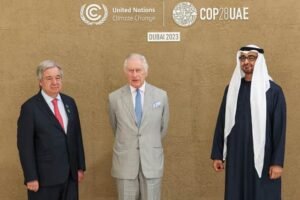In a momentous convergence of global leaders, the United Arab Emirates stands as the backdrop for the COP28 summit, where Britain’s King Charles takes center stage to champion urgent action on climate change. The monarch, on his first major address since ascending the throne in September 2022, has embarked on a mission to advocate for greater international commitment and accountability in the face of escalating environmental challenges
King Charles and Other Global Leaders at COP28.
As the king’s plane touched down in the Gulf state, anticipation swirled around the impactful address scheduled for Friday at the UN climate negotiations in Dubai. Against the backdrop of a year marked by record temperatures, the pressure on this summit to propel substantial measures to curb climate change is palpable. With temperatures soaring globally, the urgency to address the root cause—fossil fuel consumption—is more critical than ever.
Notably absent from the summit are heavyweight leaders, such as U.S. President Joe Biden and China’s President Xi Jinping. Still, the lineup boasts the presence of other influential figures, including India’s Prime Minister Narendra Modi and Britain’s Prime Minister Rishi Sunak. The discourse at COP28 promises to be pivotal, with debates over the future of fossil fuels dominating discussions.
Balance between Economic Interests and Climate Change.
The host nation, the United Arab Emirates, presents a unique dynamic as a major oil producer and member of OPEC. Striving to integrate the fossil fuel industry into the climate debate, the UAE exemplifies the delicate balance between economic interests and the imperative to address climate change.
King Charles meeting with UAE President Sheikh Mohamed
King Charles, a stalwart advocate for environmental causes for over half a century, finds himself at the nexus of this critical juncture. His engagements extend beyond the ceremonial, as he aligns with global leaders and influencers to shape the narrative of COP28. The monarch’s meeting with UAE President Sheikh Mohamed bin Zayed Al Nahyan underscores the significance of collaborative efforts in tackling the climate crisis.
President Sheikh Mohamed bin Zayed Al Nahyan underscores the significance of collaborative efforts in tackling the climate crisis.
At a reception held at the COP28 site, the United Nations climate chief, Simon Stiell, delivered a sobering message. He stressed that the world is not moving swiftly enough to combat climate change, highlighting the escalating severity of climate impacts and their toll on human life and livelihoods. Stiell’s plea for a consensus resonates as a call to action, urging leaders gathered in Dubai to overcome divisions and forge a united front against climate change.
King Charles’s Diplomatic Engagements
King Charles’s diplomatic engagements extend beyond the formal summit proceedings. Bilateral meetings with Nigerian President Bola Tinubu and Guyanan President Irfaan Ali underscore the global nature of the climate crisis. These interactions provide a platform for collaborative efforts and the exchange of ideas to navigate the complex landscape of climate action.
In a symbolic gesture, the monarch met with First Nations indigenous leaders, acknowledging the importance of indigenous perspectives in environmental stewardship. The visit to the local Dubai campus of Scottish university Heriot-Watt further emphasizes the interconnectedness of education, innovation, and sustainable practices in addressing climate challenges.
Charles Awareness Towards Environment
As the 75-year-old British monarch stands on the precipice of a historic address, the weight of his decades-long commitment to environmental causes is evident. His presence at COP28 signifies not just a ceremonial role but a hands-on engagement with the critical issues at hand. Invited by the UAE, King Charles represents the collective voice of the UK government in advocating for bold and immediate action.
In the corridors of power and amidst the bustle of diplomatic exchanges, the essence of COP28 lies in the potential for transformative change. The world watches as leaders grapple with the divergent paths laid out before them—the status quo of fossil fuel reliance or the radical shift towards sustainable alternatives.
As the summit unfolds against the dazzling backdrop of Dubai, the narrative is one of urgency, collaboration, and collective responsibility. King Charles, with his rich legacy of environmental advocacy, becomes a linchpin in this narrative, weaving together the aspirations of nations and the imperatives of the planet into a tapestry of climate action.
In the coming days, the world will witness whether COP28 emerges as a watershed moment, a catalyst for unprecedented global cooperation, or a missed opportunity that further entrenches the status quo. The king’s address, a culmination of his lifelong commitment to environmental causes, is poised to echo beyond the summit halls, resonating as a clarion call for decisive action in the face of a planetary crisis.











Comments 2